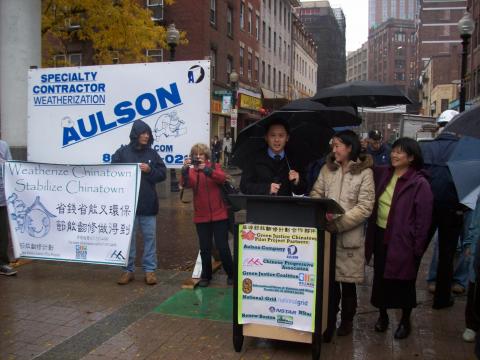
Justainability Comes to Chinatown
Last Tuesday a hundred people stood in a cold drizzle at the Chinatown Gate and kicked off a neighborhood weatherization project. City, state, and utility company officials praised each other for persevering through a year of negotiations. Chinese workers and the union construction company that hired them cut a red ribbon to start work on over 50 units of housing.
It’s good news when anyone creates jobs in today’s economy. But eight new jobs aren’t going to turn Chinatown around. What’s significant in the Chinatown Community Mobilization Initiative is the model it will test – a model based on “justainability.”
Justainability = sustainability + climate justice. “Sustainability” is apple pie: living in balance with the planet, its resources, societies, and atmosphere. “Climate justice” adds racial and economic justice. It makes green programs accessible to communities of color and low-income communities, which have paid the most (in asthma and pollution) for the fossil fuel economy. It makes our economy not just greener but more equal. In Massachusetts, it’s the Green Justice Coalition, 40 unions and community groups that are opening up the state’s energy efficiency programs so everyone can participate.
The Chinatown pilot project is Green Justice’s first test. Here’s how we hope it will work.
First, we’ll make home weatherization affordable. Weatherization is free if your household income is very low, but working families above the poverty line have to pay one-quarter of the bill for sealing up leaks and insulating their homes. Most don’t have the money, especially right now. So their energy bills are going up – to pay for other people’s weatherization – and they can’t use the programs that should work for them.
The City of Boston is solving this affordability gap with federal stimulus money. Renew Boston – the city’s new weatherization program – will make weatherization in Chinatown (and across the city) free for households earning up to 120% of state median income.
Second, we’ll make weatherization accessible. The state’s energy efficiency program is under-used, especially in city neighborhoods. Traditional utility company marketing isn’t effective when people are used to scams and utility company shut-offs. They need to hear about weatherization from neighborhood organizations they know and trust. The Chinese Progressive Association is doing community outreach for this pilot project.
Third, we’ll create good jobs. When we “bundle” dozens of weatherization jobs into one single contract, more responsible contractors can bid on the work, pay family-supporting wages, provide healthcare, pensions, thorough training and safe worksites. In Chinatown, the Aulson Company hired eight weatherization workers and the Painters’ Union trained them. Most are monolingual Chinese speakers. Wen Wei Chou, their bilingual crew chief, says the weatherization training “has not only helped me develop new skills but it has prepared for entering a new area of work within the construction field.”
The Chinatown Community Mobilization Initiative will weatherize 70 to 130 housing units. Negotiations are underway for three more pilot projects in Chelsea, Springfield, and Lynn. Once they’re done, the utility companies pledge they’ll draw out what works and apply it to their weatherization programs statewide. For updates, details, and research visithttp://www.massclu.org.
Mike Prokosch is the communications and training director at Community Labor United, which coordinates the Green Justice Coalition.
Photo courtesy of the Chinese Progressive Association.
*For more background on "justainability" check out http://www.race-talk.org/?p=3974

